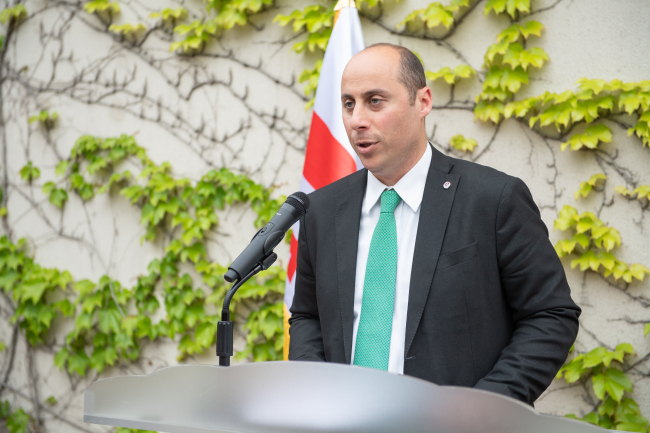The Georgian Embassy last week celebrated the centennial anniversary of the Democratic Republic of Georgia, the nation’s first modern, democratic state established on May 26, 1918 and lasting through Feb. 25, 1921.
“This year, all Georgians throughout the world share the festive spirit of this very special occasion in our country’s millennialong history,” said Georgian Ambassador to Korea Otar Berdzenishvili in a speech at a reception in Seoul on May 15.
“The declaration of independence 100 years ago was an outcome of our nation’s continuous struggle for sovereignty and restoration of statehood, which was taken away by the Russian Empire at the beginning of the 19th century.”
Despite the short life span of the democratic republic, the country achieved “remarkable results,” the envoy stressed, referring to the adoption of national symbols, liberal constitution, separation of state and church as well as global diplomatic recognition evinced by the inauguration of foreign embassies in capital Tbilisi.
 |
Georgian Ambassador to Korea Otar Berdzenishvili (Georgian Embassy) |
The modern nation-state had a parliament -- the Constituent Assembly -- that elected five female lawmakers, and as the first country worldwide, empowered a Muslim woman with parliamentary authority.
“Today’s Georgia is a liberal democracy and one of global leaders in reform and openness toward foreign investors,” the ambassador highlighted.
Georgia was ranked the highest in the Europe and Central Asia region for doing business, according to the World Bank’s “Doing Business 2018: Reforming to Create Jobs” annual report.
“With tangible reforms implemented in three key areas this year -- making electricity more affordable, strengthening minority investor protections, and making resolving insolvency easier -- Georgia continues to be a top reformer in the Europe and Central Asia region, and is poised to accelerate its inclusive and sustainable growth,” said Mercy Tembon, World Bank regional director for the South Caucasus. “We commend the government of Georgia for its remarkable achievements and encourage it to maintain the momentum.”
Berdzenishvili said that although Georgia has some 70 diplomatic missions globally, it has faced significant challenges as a result of Russia’s occupation of Abkhazia and South Ossetia and increasing efforts to annex the two regions, which Tbilisi considers its renegade provinces. Moscow has increasingly carved the two breakaway provinces out of Tbilisi’s territorial control following the 2008 Russo-Georgian War.
“Our nation’s ultimate goal is to be fully integrated into the European Union and the North Atlantic Treaty Organization, a dream cherished by all Georgians since the very first days of our independence from the Soviet Union in 1991,” the diplomat said.
He added that as Georgia had experienced challenges in its territorial sovereignty and security, it welcomed the newfound conciliation and efforts for peace between the two Koreas following the historic summit at Panmunjeom on April 27.
“Georgia believes that the upcoming summit meetings will bring tangible results for the denuclearization and lasting peace on the Korean Peninsula.”
Marking the centenary, the first charter flight took passengers from Incheon to Tbilisi on May 17, with two more direct flights slated on May 24 and 31, all operated by the Korean Air in cooperation with Hanjin Travel company. The regularization of direct flights will ensue upon the success of the three flights, according to the embassy.
Also marking the 100th milestone, the Seoul City Hall will be lit up with colors of the Georgian National Flag -- white and red -- in the evening of May 26. In autumn, the renowned Georgian folk choir Rustavi will visit Korea and hold concerts across five cities, supported by Baum Foundation, Korea Water Resources Corp. and the Georgian Embassy.
Various wines and cuisines of Georgia were presented at the reception, where numerous diplomats, dignitaries and people with connections to the South Caucasian country paid visits.
By Joel Lee (
joel@heraldcorp.com)








